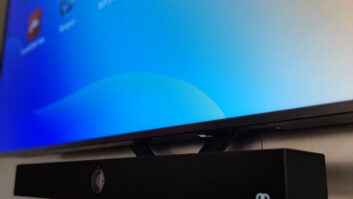
Kicking and Screaming into a Tiny Future
Jul 18, 2011 5:44 PM,
By Jason Bovberg

I feel like I was born at the wrong time. A larger time. I was born and bred to live life large—well, at least when it comes to consumer electronics. My earliest memories are of my dad spinning LPs on his gigantic furniture-based sound system, which weighed a metric ton and seemed to take up half the room. He’d listen to local baseball games on this monstrosity’s AM radio; I remember him bending over the top of the thing, tuning the dial, then reclining in his easy chair to enjoy a refreshing beverage. Later that evening, the family would gather round the color television set—also a piece of furniture unto itself, with its own wooden peg legs anchoring it to the floor. And at the end of the day, of course, we’d all sit back with our favorite hardcover book—my dad from his own private library of history tomes and me from my public library stash.
These are the models by which I’ve lived my life, even into the 21st century. Bigger is better. I took that philosophy by the horns, man! Over my lifetime, I’ve built a respectable library full of hardcover books; I’ve gone through several audio systems, putting a priority on gathering media such as, yes, LPs (still!), cassette tapes, and CDs (and Super Audio CDs); I’ve constructed three home theaters, each larger than the last, each emphasizing my passion for collecting movies and documentaries and concerts on physical media. After all, in my world, ownership of physical media is King.
But guess who’s the Fool now?
In the past few years, I’ve watched a big part of my life gradually become small and even obsolete. It started with music. Who would have guessed something as simple and sturdy as the compact disc would retreat from popular favor? And the medium that bested it? The low-fidelity digital file, played largely on the MP3 player and cheap earbud headphones. Who would have guessed something as elemental as the printed page would begin to die away, in favor of—you guessed it—digital files, which people click or swipe through on their little ebooks and even tinier smartphone screens? Finally, who would have guessed that movies—traditionally best enjoyed on the largest screen possible, with the loudest, most immersive sound available—would shrink in the consumer world to the size of the PC or iPad screen, or worse, the smartphone display, with those devices’ tinny, brassy speakers and glare? And the reason all my favorite forms of media have shrunk in the consumer electronics realm?
Convenience.
Oh, people love carrying their media around with them. From planes to trains to (gasp) automobiles, commuters are immersed in their private digitized worlds of anytime/anywhere entertainment. From swimming pools to beaches to public parks, weekend frolickers are glued to their 3G phones and iPods and Kindles. Remember those weird early days of the hands-free cell phone, when you’d see people in the supermarket, seemingly talking to themselves? Your first thought: That person is insane. Today, you’re more likely to observe people lost in their solitary worlds, singing to themselves or privately rocking out or talking animatedly to themselves, than at any other point in human history. The world has gone insane. All in the name of convenience.
But since when is art about convenience?
Books, music, film—the premier forms of 21st century art. And each one is shrinking, becoming less vital, losing artistic credibility. These media have always straddled a line between entertainment and art; a portion of the audience has reveled in the more base, empty entertainment value of books, music, and/or movie, and another portion values the deeper, more resonant qualities of a great novel, album, or film. Some people can deconstruct a song or film into a multi-layered essay; others are better at just snapping their fingers. Is it elitist to say that it seems the audience is tipping much farther toward the finger-snapping crowd than it ever has?
This past weekend, I attended a family get-together, and my college-age cousin was kicking back on a chair, swiping through his Facebook status on his iPhone. Later, he spent some time texting with friends, laughing to himself. Still later, he watched a music video on the phone, and then played some free game apps for a long time, until the battery ran low. When we were talking about films later, he told me he’d watched a digital version of a Pixar film on his phone the week before. He was smiling and bright-eyed and all gee-wiz about this admission, as in, Finally! I’m one big step closer to containing all of my pursuits and interests on this device! (Meanwhile, family members that he hadn’t seen in over a year were in another part of the house, catching up, spending “quality” time together.)
It was a striking moment. And within it, I saw our inevitable future, one in which all media is in digital form, to be enjoyed on anytime/anywhere devices—mostly small. It’s a world that has essentially lost the tactile feel of a piece of art in your hand, and in its place are bits and bytes contained in a piece of plastic and metal. No longer will we feel the heft of a hardcover book in our out-splayed hands, the spine softly cracking as we turn the pages. Libraries of books or films or music won’t take up walls in our homes, displayed proudly as projections of our various personalities and conversation pieces for visitors, but rather take up storage on our computer systems, or in our paid-monthly cloud-storage services.
Already, it feels as if I’m beginning to describe antiquated notions that are in the process of giving way to a more modern, streamlined, and—yes—convenient method of media ownership and consumption. And sure, I freely admit I’m something of a dinosaur, facing extinction. But I fear we’re about to lose something more elemental in our quest for convenience: not only art, but our very appreciation and understanding of art.
What do you think?










